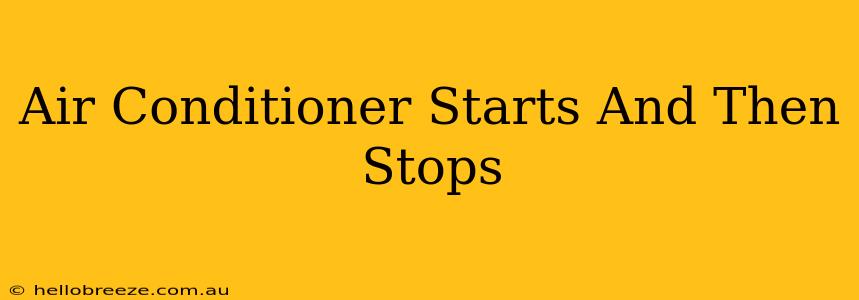Is your air conditioner turning on, only to immediately shut off? This frustrating problem can leave you sweating, but don't worry! This comprehensive guide will walk you through the most common causes of an AC unit that starts and stops, helping you diagnose and potentially fix the issue yourself, or at least understand what a technician needs to know.
Common Reasons Why Your AC Starts and Stops
Several factors can cause your air conditioner to exhibit this on-again, off-again behavior. Let's break down the most frequent culprits:
1. Frozen Evaporator Coil:
This is a very common reason. A frozen evaporator coil restricts airflow, causing the unit to shut down to prevent damage. This freezing often stems from:
- Dirty Air Filter: A clogged filter restricts airflow, leading to reduced cooling efficiency and eventual freezing. Regular filter changes are crucial! Aim for at least monthly cleaning or replacement, depending on your usage and filter type.
- Low Refrigerant: Insufficient refrigerant means the system can't absorb enough heat, resulting in freezing. This requires professional attention.
- Restricted Airflow: Blocked vents, dirty coils (not just the filter!), or a clogged drain line can all contribute to restricted airflow and freezing.
Solution: Check and clean or replace your air filter. If you suspect low refrigerant or a more serious blockage, call an HVAC professional. Never attempt to defrost the coil yourself using a hairdryer or other heating devices, as this can cause damage.
2. Electrical Issues:
Problems with the electrical components can also cause the AC to cycle on and off rapidly. These can include:
- Tripped Breaker: Check your breaker box for a tripped breaker related to your AC unit. Simply reset it. However, if it trips again immediately, there's a more serious underlying electrical problem.
- Faulty Capacitor: The capacitor stores energy for the compressor to start. A failing capacitor can prevent the compressor from running consistently. This requires professional replacement.
- Wiring Problems: Loose or damaged wiring can interrupt the power supply to the unit. This is a job for a qualified electrician or HVAC technician.
Solution: Check your breaker box first. If the issue persists, contact a qualified technician. Do not attempt to diagnose or repair electrical issues yourself unless you have the proper training and experience.
3. Compressor Problems:
The compressor is the heart of your AC system. If it's failing, it may struggle to start or run consistently, leading to the on-and-off cycling.
- Worn-Out Compressor: A compressor nearing the end of its life might struggle to maintain pressure and function correctly. This usually indicates the need for a costly compressor replacement.
- Overheating Compressor: Excessive heat can cause the compressor to shut down as a safety measure. This might be due to restricted airflow or other underlying problems.
Solution: A malfunctioning compressor is serious and requires the attention of an experienced HVAC technician.
4. Overheating:
The AC unit's internal components may be overheating.
- Insufficient Airflow: Check that all vents are open and unobstructed. Clean any accumulated dust and debris from the condenser coils (outside unit) with a coil cleaning brush.
- Ambient Temperature: Extreme outside temperatures can stress the AC unit.
Solution: Improve airflow around the unit. Consider scheduling maintenance during the hotter months.
When to Call a Professional
While some minor issues can be addressed with simple troubleshooting, certain problems demand professional help. Contact a qualified HVAC technician if:
- You suspect low refrigerant.
- There are electrical issues beyond a simple tripped breaker.
- The compressor seems to be malfunctioning.
- The problem persists after checking the filter and airflow.
Regular AC maintenance can significantly reduce the risk of these problems. Scheduling annual inspections and cleaning can help keep your unit running efficiently and extend its lifespan. Preventing costly repairs is far easier than fixing them!

